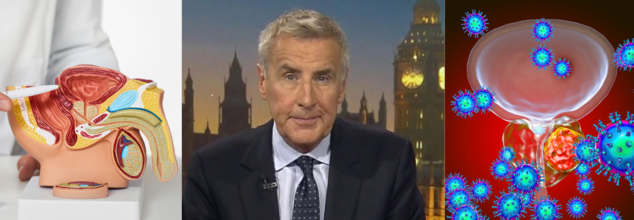- Health Conditions A-Z
- Health & Wellness
- Nutrition
- Fitness
- Health News
- Ayurveda
- Videos
- Medicine A-Z
- Parenting
- Web Stories
Ex-Sky TV Presenter Dermot Murnaghan Reveals Stage 4 Prostate Cancer

Credits: Canva and SKY News
Veteran journalist and broadcaster Dermot Murnaghan has revealed that he has been diagnosed with stage 4 prostate cancer.
The 67-year-old, known for anchoring major news shows across ITV, BBC, and Sky News, shared the news on social media. He also added that he is currently feeling well and responding positively to treatment.
Murnaghan wrote on X (formerly Twitter), “Some personal news… I’ve been diagnosed with Stage IV advanced prostate cancer.”
He added, “I’m fortunate to have a simply outstanding medical team looking after me, who I can’t thank enough—they are administering the best possible care with expertise, compassion and sensitivity.” He also shared his gratitude for the "monumental love and support" he’s received from his wife, family, and close friends.
Drawing From Personal Experiences To Raise Awareness
Murnaghan used his post to raise awareness about prostate cancer and called on men, especially those over 50 or in high-risk groups, to get themselves tested. “Early detection is crucial,” he wrote. “And be aware, this disease can sometimes progress rapidly without obvious symptoms.” He also voiced his support for routine prostate cancer screening through the NHS.
Despite his diagnosis, Murnaghan said he hopes to take part in the upcoming Tour De 4 charity bike ride in Glasgow this September. The event is organized by Olympic cycling champion Sir Chris Hoy, who also has prostate cancer. The ride aims to challenge public perceptions about living with stage four cancer and show that many people continue to lead active, fulfilling lives even while undergoing treatment.
Life of Dermot Murnaghan
Dermot Murnaghan has had a long and respected career in British media. He began his journalism journey at Channel 4 News and later anchored ITV’s The Big Story, News at Ten, Evening News, and Nightly News through the 1990s and early 2000s. In 2002, he moved to the BBC, where he became a familiar face on BBC Breakfast, the Six O'Clock News, and the Ten O’Clock News. From 2003 to 2014, he hosted the popular BBC quiz show Eggheads. He joined Sky News in 2007, where he remained a leading anchor until 2023.
In addition to his news broadcasting, Murnaghan has presented true-crime documentary series such as Crimes That Shook Britain and Killer Britain. He also currently hosts a podcast called Legends of News, where he speaks with experienced journalists about some of the most significant stories they've covered.
What is Prostate Cancer?
Prostate cancer affects the prostate gland, a small walnut-sized part of the male reproductive system located just below the bladder. It is most common in older men, particularly those over 75. Risk factors include age, family history, and ethnicity, with black men facing a higher risk.
Symptoms can include frequent urination (especially at night), difficulty starting or stopping urination, weak urine flow, and blood in urine or semen. However, some cases progress without noticeable symptoms.
Stage 4 prostate cancer means the disease has spread to other parts of the body. While outcomes vary, around half of men diagnosed at this stage live for five years or more, according to Cancer Research UK.
Murnaghan’s message is clear: awareness and early testing can make all the difference.
Plastic Waste To Paracetamol - Scientific Breakthrough Uses Harmless Bacteria To Make Common Mild-Pain Reliever

(Credit-Canva)
It is not an unknown fact that we produce a tremendous amount of waste each year. However, many of us are unaware of the actual numbers. According to 2025 Statistica, global plastic waste generation has grown sevenfold in the past four decades. We have reached 360 million tons of plastic waste per year. The concerning fact that this number keeps increasing, researchers have been actively looking at ways to eliminate this wastage. A new study may have found an effective way to do so.
A new study published in Nature Chemistry suggests it is possible to turn common plastic waste to be turned into paracetamol, a common painkiller. Researchers have found a new way to make paracetamol from everyday plastic waste, which is much better for the planet than how it's made now. This new method could completely change how we produce this medicine, making it much more sustainable and eco-friendly.
Problem with Traditional Paracetamol Production
Right now, a big issue that we are facing is that making paracetamol relies on fossil fuels like crude oil, which are limited resources and will eventually run out.
Researchers emphasize that this is an old way of making medicine and is also a big reason for climate change. Factories that produce paracetamol use a lot of fossil fuels every year, releasing harmful gases into the air. It's not a sustainable process, and it contributes a lot to our environmental problems.
Solution to Plastic Pollution
This exciting new discovery also helps tackle a huge problem, which is plastic waste. A type of plastic called PET (polyethylene terephthalate), which is found in water bottles and food packaging. All the waste we create it ends up in landfills or polluting our oceans, causing serious damage to the environment. Even though we can recycle PET, the current methods often create products that still add to plastic pollution. This new method offers a way to truly transform that waste.Scientists at the University of Edinburgh found an interesting way to use a common germ called E. coli. They changed the E. coli's genetic code, basically reprogramming it. This changed E. coli can then take a substance from PET plastic, called terephthalic acid, and turn it into the main part of paracetamol. It's like a tiny, living factory! They use a process similar to brewing beer to speed up this change, turning plastic waste into paracetamol in less than 24 hours.
Sustainable and Efficient Production
One of the best things about this new way of making paracetamol is how environmentally friendly it is. It works at room temperature, so it doesn't need a lot of energy. Plus, it creates almost no carbon pollution, making it a truly sustainable way to produce medicine. The results were very successful, about 90% of what they produced from the plastic became paracetamol. While they still need to figure out how to make it in larger amounts for widespread use, this is a huge step forward for creating medicines in a way that's good for our planet.Future of Sustainable Manufacturing
This research really shows the power of engineering biology. This field uses engineering ideas to harness what living things can do to create new products. As Professor Stephen Wallace, who led the study, explains, this work proves that traditional chemistry can team up with engineering biology to create "living microbial factories." These microbial factories can produce useful chemicals in a sustainable way, cutting down on waste, greenhouse gas emissions, and our reliance on fossil fuels.The study, which was published in Nature Chemistry, got funding from EPSRC CASE and the pharmaceutical company AstraZeneca. This discovery proves that PET plastic isn't just trash; it can be transformed by tiny organisms into valuable new products, even ones that can help treat diseases.
Jessie J Breast Cancer Update 'Last Show Before I Go Beat Breast Cancer'- Early Diagnosis & Surgery

(Credit-Jessiej/Instagram)
Undergoing breast cancer surgery, pop artist Jessie J shared her cancer journey from early diagnosis, the panic and stress of facing cancer as well as her surgery. On Monday night, she posted a series of selfies from her hospital bed on Instagram, that showcased the realities of post-operative care, including bandages and a surgical drain. She captioned the post saying she wanted to highlight the " good and hard bits " to her fans, as well as wishing well to everyone who is going through tough times in their lives, ending the post with an encouraging “We all got this!”
Early Breast Cancer Diagnosis
Earlier this month, Jessie J, who reassured fans her condition was "caught early," revealed she had experienced her "worst day so far" in her cancer battle.The American Cancer Society highlights how breast cancer is sometimes can only be found after symptoms appear, however there are many times that breast cancer has no symptoms. They emphasize the importance of breast cancer screenings.
Signs And Symptoms of Breast Cancer
The most common symptom of breast cancer is a lump or a mass in the breast tissue. The lump is a painless, hard lump with uneven edges is more likely to be cancerous. It's important to know that breast cancers can also feel soft, round, tender, or even cause pain. Other signs could be,- Swelling in all or part of a breast, even if you don't feel a lump.
- Skin dimpling, which might look like the skin of an orange peel.
- Pain in the breast or nipple.
- A nipple turning inward (nipple retraction).
- Red, dry, flaky, or thickened skin on the nipple or breast.
- Any discharge from the nipple that isn't breast milk.
- Swollen lymph nodes under your arm or near your collarbone
At her Capital's Summertime Ball with Barclaycard at Wembley Stadium, Jessie J tearfully vowed to "beat" breast cancer. Addressing the 75,000-strong crowd, she thanked them for their support, declaring, "Today, this show is my last show before I go to beat breast cancer!" She emphasized how special the moment was to her, feeling grateful for her life, career, son, partner, parents, and entire support system.
How Does Dealing With Cancer Affect One’s Mental Health
In a lengthy Instagram Stories post, she described battling panic attacks, tears, fears, and anger while juggling "Work. Toddler. Cancer. life." She humorously shared that eating corn on the cob helped shift her mood, recommending it as a distraction.Highlighting an unspoken part about her cancer journey, Jessie spoke about how dealing with cancer affected her mentally. In another post she explained how “holding it in won't make it go away”.
Cancer Research UK explains that it is completely normal to feel normal to feel overwhelmed and out of control. Dealing with a lot of new information and big emotions, thoughts like “why me” or “how will my family feel about this”.
Experts advice that people who have had recent diagnoses should not deal with this alone as one person shared, bottling it up isn't good for their mental health. A person can ask for mental health support at any time – they don't have to wait until things get really bad.
There are different ways to get help, and what's right for them depends on how they feel. To get started, they might consider telling their cancer team about their mental wellbeing, talking to a mental health professional about their cancer, or simply confiding in someone they trust.
Embracing All Emotions
Jessie J stressed the importance of acknowledging fear, anger, sadness, panic, and overwhelm, explaining that "holding it in won't make it go away." She clarified that her previous post, while making light of the situation, represented just one challenging day out of ten weeks."So I will cry, I will be scared, I will panic, I will feel all of it for a minute or even a full day," she wrote, adding that she then finds ways to cope, like eating corn, listening to uplifting music, or laughing with friends. Ultimately, she aims to be "Strong, fearless, healthy" 90% of the time, while acknowledging and processing the "10% that is fear and sadness."
Flying Can Be Risky If You Have These Health Conditions

Flying is a common and generally safe way to travel for vacations, whether you're going on a romantic trip or visiting family. While planes do give us a convenient mode of transport, they do come with certain health considerations. Issues can range from simple stress to more complex physical changes that affect your heart, blood vessels, and even your brain.
Can The Air Inside The Cabin Cause Issues?
The air inside a commercial flight cabin is pressurized to feel like you're at an altitude similar to being in a mountain town, like Estes Park, Colorado, which is around 6,000 to 8,000 feet high. This means there's slightly less oxygen available than you might normally breathe. The cabin air can also be very dry, with low humidity levels.
For most healthy individuals, breathing the cabin air isn't an issue. However, lower air pressure can worsen existing conditions for some people. This includes those
- Anemia
- Underlying lung problems
- A history of stroke
- Other conditions requiring extra oxygen
- Individuals with heart disease or heart failure
If you have any concerns about whether flying is safe for you, it's always best to consult your doctor, especially if you've recently experienced a heart attack or stroke.
Things People With Heart Conditions To Keep In Mind
The reduced air pressure also causes gases trapped inside your body to expand. This can be a concern for anyone who has had bypass surgery within the last 10 days. Expanding air can also lead to common discomfort like abdominal pain, sinus pain, or "airplane ear." While decongestants can help with ear and sinus symptoms, it's important to note they can raise blood pressure and should be used cautiously, especially if you have severe or uncontrolled high blood pressure.
Other Travel Health Tips For Safety
Staying Hydrated and Avoiding Germs in the Cabin
Plane air is very dry, which can cause dry eyes or a cough. To stay hydrated, always carry a water bottle to fill after security and limit dehydrating drinks like caffeine and alcohol. Modern planes have clean, filtered air, reducing widespread germ spread. However, you can still catch germs from nearby passengers, so carrying a face mask is a smart precaution, especially if someone near you is coughing.
Minimizing the Risk of Blood Clots
Long flights mean long periods of sitting still, which increases the risk of blood clots (DVT), especially in your legs. While rare, these can be serious if they travel to your lungs. To help prevent them, consider wearing compression socks on longer flights. Also, stay hydrated, avoid crossing your legs, flex your leg muscles, and walk around the cabin when safe. Always keep your seatbelt fastened to avoid injury from unexpected turbulence.
Managing Stress During Air Travel
Air travel can be stressful, impacting your mental well-being. To cope, practice patience and understanding with fellow passengers and flight crew. If you're a nervous flier, use familiar calming techniques like deep breathing or listening to music. Traveling with a supportive companion can also help. Remember to avoid alcohol, as it can actually worsen anxiety and dehydration, making a stressful situation even more challenging.
Essential Pre-Flight Health Preparations
Before your trip, it's crucial to consult your doctor to ensure you're fit to fly. The physical demands of travel, like navigating airports, can be surprisingly strenuous. If cleared, keep all medications in your carry-on and have a list of them handy. If you have a heart condition, carry a copy of your ECG or device card. For international trips, confirm your vaccinations are current. Finally, pack snacks and food for potential delays.
Prioritizing Sleep While Traveling
Travel often disrupts sleep, which is vital for heart health. Adjusting to new time zones is harder when flying east; aim for mid-morning light exposure to reset your body clock. While getting sleep is important, be careful with alcohol, as it can hinder restful sleep despite making you drowsy. Avoid new sleep aids or anxiety medications. Instead, stick to your usual bedtime routine, like reading, to help maintain normalcy on your journey.
© 2024 Bennett, Coleman & Company Limited

